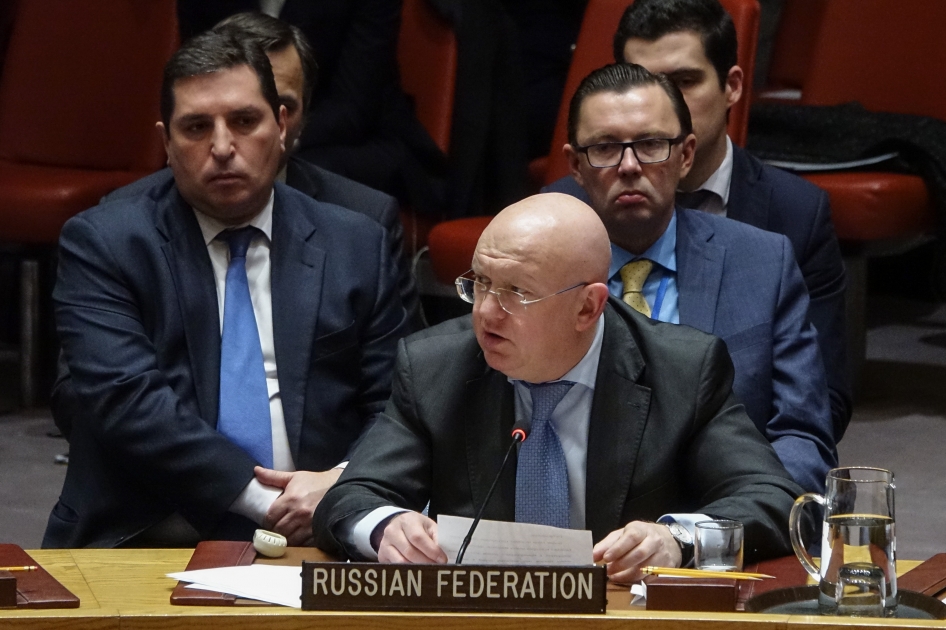Statement by Ambassador Vassily A. Nebenzia, Permanent Representative of the Russian Federation to the United Nations, at the Security Council meeting on non-proliferation (DPRK)
We wish to thank you, Mr. President, in your capacity as Chair of the Security Council Committee established pursuant to resolution 1718 (2006), for your presentation of the 90-day report, as well as UnderSecretary-General Feltman for his briefing on the launch by the Democratic People’s Republic of Korea of a ballistic missile on 28 November.
This fresh violation by Pyongyang of a Security Council resolution is cause for deep disappointment. Once again, we must take stock of the fact that prospects for normalizing the situation on the Korean peninsula remain very distant. There is no doubt that this further demonstration of the Democratic People’s Republic of Korea’s open disregard of the demands set out in the resolutions of the Security Council and the norms of international law justifies the strongest condemnation.
Russia does not accept the Democratic People’s Republic of Korea’s goal of acquiring the status of a nuclear power and has supported all Security Council resolutions demanding an end to the missile and nuclear programme of Pyongyang, in the interests of denuclearizing the Korean peninsula.
At the same time, it is clear to us that there can be no military solution to the problems on the Korean peninsula. Given current conditions, we strongly call on all parties concerned to halt the spiral of tension that seems to follow each cycle of reaction and counterreaction. It is essential to take a step back and carefully weigh the consequences of each move and to revise the policy of mutual threats and intimidation, because such a policy can only have the opposite effect of what is being sought.
It is in the interest of the entire international community for the situation on the Korean peninsula to be resolved only through peaceful means. In the meantime, until the States of the region show their readiness to pay due attention to the political components of all sanctions resolutions, including resolution 2375 (2017), the situation will continue to deteriorate, creating in a vicious circle.
Sanctions against Pyongyang are simply an instrument aimed at engaging it in constructive negotiations and should not be used either to strangle the Democratic People’s Republic of Korea economically or to intentionally worsen the humanitarian situation. This pertains in particular to the illegal unilateral restrictions that strike at the civilian sector and have no link to the country’s missile and nuclear programmes.
Over the past two and a half months, the United States and its allies seem to have been testing Pyongyang’s patience with their activities, including undeclared, unscheduled military manoeuvres in October, recently instituted unilateral sanctions, and United States and South Korean military and air exercises to be conducted next week on an unprecedented scale near the border of the Democratic People’s Republic of Korea, and which were only just announced.
Against a backdrop of relative calm from Pyongyang, these incessant gestures of hostility towards the Democratic People’s Republic of Korea compel us to reconsider the sincerity of the statements being made about preferring to use peaceful means to resolve the crisis surrounding the Democratic People’s Republic of Korea.
We believe that this time should have been used to take concrete steps to make direct contact with Pyongyang rather than further escalating tensions. A comprehensive solution to the problems of the Korean peninsula is possible only in the framework of a general military and political détente in North-East Asia, reducing the level of military confrontation and establishing mutual trust among the States involved in the region.
That was the approach proposed by Russia and China in their joint statement on 4 July on a road map for gradual progress towards a settlement, starting with the principle of suspension for suspension, which envisions a halt by the Democratic People’s Republic of Korea to its missile and nuclear tests with at the same time a reduction by the United States and South Korea of the scale and intensity of their military exercises. That in turn would pave the way to a discussion of the principles of peaceful coexistence between Washington and Pyongyang and a resumption of the inter-Korean dialogue.
It must be clear to everyone that making progress towards achieving a comprehensive settlement of the Korean peninsula’s issues will be difficult as long as the Democratic People’s Republic of Korea feels that its security is directly threatened. And that is how Pyongyang sees the military hyperactivity that is going on in the region in the form of the conduct of regular, large-scale manoeuvres and exercises by the United States and its allies, as well as by sending strategic bombers and naval forces, including aircraft carriers.
An additional destabilizing factor in the region has been the ramping up in the Republic of Korea of elements of the American Terminal High Altitude Area Defense anti-missile system.
We have repeatedly stated that such moves are not only an irritant but undermine the military balance in the region generally and jeopardize the security of neighbouring States. It is now more important than ever for the parties involved to refrain from provoking each other, show restraint and make sure that no further steps are taken that could further escalate tensions.
In that regard, we strongly urge the Democratic People’s Republic of Korea to stop its nuclear-missile tests and call on the United States and the Republic of Korea to refrain from the large-scale unscheduled military manoeuvres starting at the beginning of December, which will only inflame an already explosive situation.
Russia’s position on resolving the situation around the Korean peninsula remains unchanged. Finding a long-term, mutually acceptable solution to all the problems can be achieved effectively only through determined, active diplomacy.
In that context, we call on all sides to start working without delay on finding a formula for a political and diplomatic settlement. We see no rational alternative to that.
